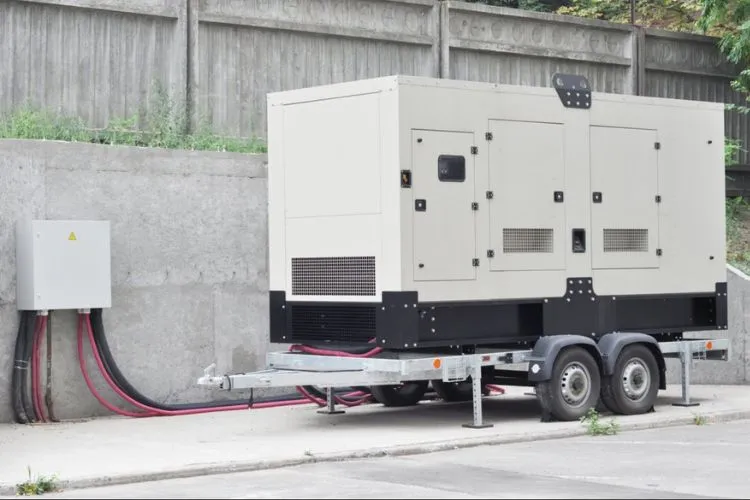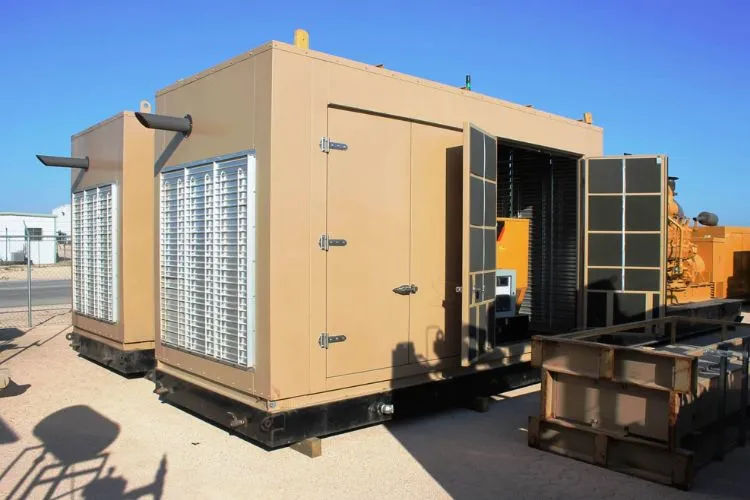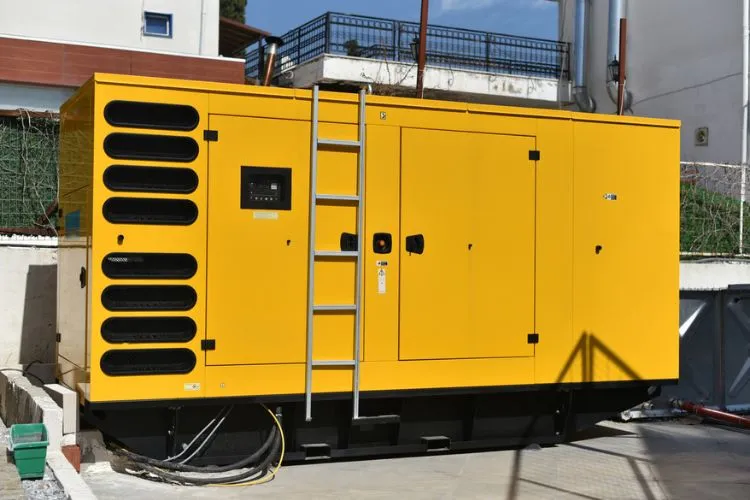In today’s rapidly evolving business landscape, where uninterrupted power supply has become a non-negotiable requirement, commercial generators stand out as a critical backup solution.
This article delves into the pros and cons of commercial generators along with their multifaceted roles, and more.
Our goal is to equip businesses with the essential insights needed to make informed decisions when incorporating these power solutions into their operational framework.

What are Commercial Generators?
Commercial generators are robust power supply units designed to kick in during power outages, ensuring businesses continue to operate without hitches.
These generators vary widely, from diesel-fueled models to natural gas and bi-fuel variants, each serving distinct industries — healthcare, IT, and construction, to name a few.
Their versatility not only lies in the choice of fuel but also in their deployment, as businesses can opt for portable units for short-term needs or install stationary ones for sustained operations.
Pros and Cons of Commercial Generators
Pros of Commercial Generators
Reliability
The primary merit of integrating a commercial generator into a business’s infrastructure is undeniable reliability. Facilities like hospitals and data centers, where power disruption is not an option, find generators indispensable.
They ensure that essential functions, from life-saving medical equipment in hospitals to critical data protection in IT centers, run without interruption.
Power Capacity
Commercial generators are engineered to meet high power demands, making them capable of supporting operations large and small.
Their power output varies significantly, offering a range of solutions tailored to the scale of business needs. This capability ensures that, regardless of the size of your operation, there’s a generator out there that fits the bill.
Flexibility
The market offers a spectrum of generators, accommodating various business models with their flexibility. Whether you’re in a remote location relying on a portable unit or a sprawling campus in need of stationary power, the right generator exists.
Additionally, the choice between fuels — natural gas, diesel, etc. — allows businesses to consider operational costs and fuel accessibility.
Financial Benefits
Investing in a commercial generator goes beyond ensuring uninterrupted operations; it’s also a financially sound strategy. The cost saved by avoiding downtime can significantly outweigh the initial setup and operational expenses.
Moreover, some businesses may benefit from tax incentives for incorporating certain technologies or adhering to energy standards.
Cons of Commercial Generators
Initial Investment
The upfront cost of acquiring and installing a commercial generator can be steep. This expense varies with the type and size of the generator, making it vital for businesses to thoroughly assess their power needs against their budgets.
The initial investment includes not just purchasing the generator but also installation costs, which can escalate depending on site-specific requirements.
Operating Costs
Running a commercial generator involves ongoing expenses, primarily fuel consumption. Diesel and gas generators, in particular, can lead to significant operating costs, especially during sustained use.
Additionally, regular maintenance and occasional repairs add to the total cost of ownership, necessitating a careful evaluation of the operational budget.
Environmental Impact
The environmental considerations of using commercial generators cannot be overlooked. Diesel and gas models emit pollutants that contribute to environmental degradation and climate change.
Noise pollution is another factor, with generators often producing a significant amount of sound during operation, which can be problematic in certain settings.
Dependence on Fuel Availability
Fuel availability is a critical concern, particularly during prolonged outages or in remote locations. The reliability of a generator is inherently tied to the steady supply of fuel, making it vulnerable to shortages and price fluctuations.
This dependence on fuel availability can introduce an element of risk into operational planning.
How to Choose the Right Commercial Generator

Selecting the proper commercial generator requires a thoughtful approach. Considerations such as the size of your operations, location, and specific power needs play pivotal roles.
Consultation with power solutions experts can provide valuable guidance, helping businesses navigate through the complexities of power capacity, fuel options, and installation requirements to find an optimal solution.
Maintenance and Safety
To ensure longevity and safe operation, regular maintenance of your commercial generator is essential. Routine checks and servicing can prevent unexpected breakdowns, ensuring your generator is ready when you need it most.
Additionally, adhering to safety guidelines minimizes risks, protecting both personnel and equipment.
Pro Tips
Considering the total cost of ownership rather than just the purchase price can lead to a more informed decision. Planning for future expansion can ensure the chosen generator meets long-term needs.
Exploring environmentally friendly options can mitigate some of the cons, aligning your choice with broader ecological goals.

Frequently Asked Questions (FAQs)
How long can a commercial generator run continuously?
The runtime of a commercial generator varies based on its model, fuel type, and capacity. Diesel generators, for instance, can often run for 24 to 48 hours continuously before needing refueling.
What are the legal requirements for installing a commercial generator?
Legal requirements can vary by location, including noise restrictions, emissions standards, and installation permits. It’s crucial to consult local regulations and obtain necessary permits before installation.
How often should commercial generators be serviced?
Regular service intervals depend on the generator type and usage but typically range from semi-annual to annual maintenance checks, with more frequent inspections during high-use periods.
Can a commercial generator power an entire business facility?
Yes, with proper sizing and installation, a commercial generator can power an entire facility. It’s important to assess the total power needs of your operations to choose an appropriately sized generator.
What steps can be taken to reduce the environmental impact of a generator?
Opting for generators with lower emissions, using cleaner fuels like natural gas, and ensuring regular maintenance to keep the generator running efficiently can help reduce its environmental impact.
Conclusion:
The decision to invest in a commercial generator involves weighing its pros against its cons.
While the reliability, power capacity, flexibility, and financial benefits make a compelling case, considerations around initial and operating costs, environmental impact, and fuel dependence necessitate a measured approach.
By thoroughly evaluating these factors against business needs, organizations can navigate the complexities of choosing and maintaining a commercial generator effectively.
